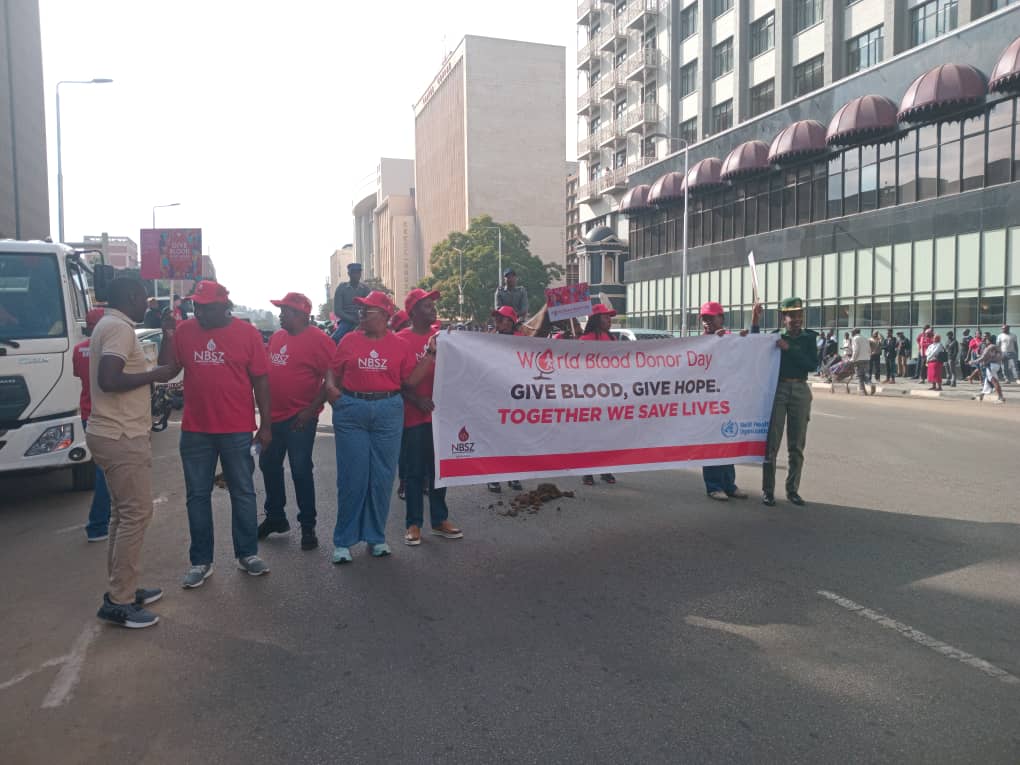By Edward Makuzva
Blood donors are often the unsung heroes of the healthcare system, without the spotlight or fanfare, these individuals make an irreplaceable contribution to saving lives.
Hospitals rely on blood donations to respond to a wide array of medical needs with the blood being used to save a accident victim, women experiencing complications during childbirth — such as postpartum hemorrhage — access to donated blood can mean the difference between life and death.
Maternal mortality remains a critical issue in many parts of Zimbabwe, and timely blood transfusions are among the most effective interventions available.
Road traffic accidents, a leading cause of injury-related deaths in the country, also create an urgent demand for blood. In critical trauma situations, massive blood loss requires rapid transfusions to stabilize patients. Paramedics and doctors often say that without a ready supply of blood, many accident victims wouldn’t survive the first hour.
National Blood Services Zimbabwe (NBSZ) Chief Executive Officer Lucia Marowa noted that the upcoming national celebrations are expected to bring together donors, healthcare professionals, students, and civic leaders to honor those who regularly roll up their sleeves to give the gift of life.
“Today, we are bringing awareness to the people of Zimbabwe about the existence of a day called World Blood Donor Day. This day has been set aside by the World Health Organization and is celebrated annually on the 14th of June.
“It is a day to say thank you to the men and women who selflessly donate blood without expecting any form of payment. We celebrate their heroic acts.
“As we prepare for our main celebrations on Saturday in Kadoma at Jameson High School, we are calling upon adults, and even young adults aged 16 to 60 years who are generally in good health and weigh over 50 kg, to come and donate blood,” Marowa explained.
According to the National Blood Services Zimbabwe, a single unit of blood has the potential to save up to three lives. This is made possible through the separation of donated blood into its core components: red blood cells, plasma, and platelets. Each component can be used to treat different medical conditions, ensuring maximum impact from every donation.
Zimbabwe Prisons and Correctional Services Chief Superintendent Dr. Itai Memory Vengesai revealed that every drop of blood donated represents hope—whether it’s for a mother experiencing complicated childbirth, a child battling cancer, an accident victim fighting for life, or a patient undergoing life-saving surgery.
“Today we gather to recognize one of the most profound acts of generosity — blood donation. Every drop of blood donated offers hope.
“In Zimbabwe, where our healthcare system faces various challenges, voluntary blood donation is a cornerstone of our collective survival and the backbone of our healthcare system.
“Blood cannot be artificially manufactured in a laboratory or replaced by synthetic products. It can only come from the veins of voluntary donors. Every two seconds, someone in our healthcare system is in dire need of blood or its products. With one pint of blood, three lives can be saved,” Dr. Vengesai explained.
Dr. Vengesai highlighted that in Zimbabwe, blood shortages remain a persistent challenge, with the country’s demand often surpassing availability. This shortage costs lives that could otherwise be saved with adequate blood reserves.
In addition, Dr. Vengesai emphasized that the partnership between NBSZ and correctional facilities demonstrates a commitment to transforming these institutions into centers of community service and rehabilitation through meaningful societal contributions.
“Thanks to this ongoing collaboration, correctional officers, dependents, and eligible inmates actively participate in blood donations, committed to turning places of confinement into sources of life-giving hope.
“As we celebrate World Blood Donor Day, I would like to assure NBSZ and the nation that we at ZPCS will continue not just to advocate for blood donation, but also to be part of the solution in addressing critical blood shortages. We will provide inmates with opportunities for positive community contribution and reinforce the rehabilitative mission of our correctional system.
“The National Blood Service Zimbabwe will strive to break down barriers and continue building bridges between correctional institutions and the broader community, fostering understanding and shared purpose in saving lives as a united front—leaving no one and no place behind,” she said.
Tinashe Matongera, a dedicated blood donor, has become a beacon of hope, helping to break the stigma and fear often associated with blood donation, and inspiring a culture of giving, especially among young people in Zimbabwe.
“Each drop of blood is a chance to save a life,” says Matongera. “If we, the youth, don’t lead by example, who will?”
Matongera, a passionate advocate for community health, strongly emphasizes the importance of donating blood as a simple yet powerful act that can save lives.
He believes that each donation is a gift of hope — especially for accident victims, pregnant mothers, and patients with chronic illnesses who rely on transfusions.
Matongera urged the youth to step up and donate regularly, highlighting that a single pint of blood can help up to three people.
“Donating blood is not just a civic duty but a humanitarian gesture that strengthens the bond within communities and reminds us of our shared responsibility to care for one another,” said Matongera.
As Zimbabwe gears up to celebrate the World Blood Donor Day, the message is clear: donating blood is a simple yet powerful act that builds stronger, healthier communities. And there is always room for more heroes.

